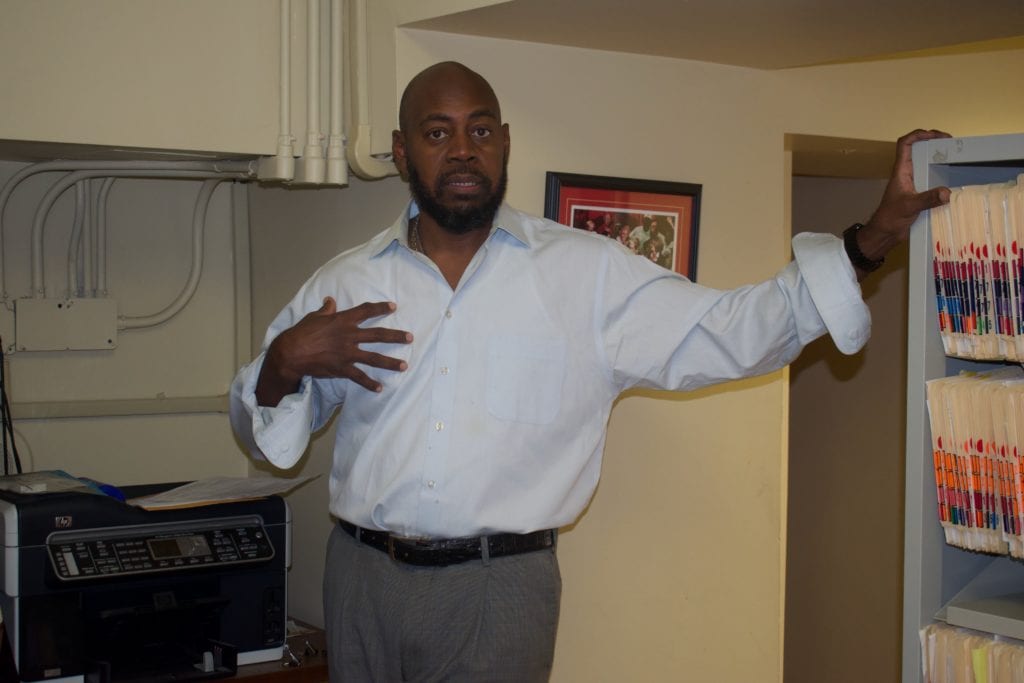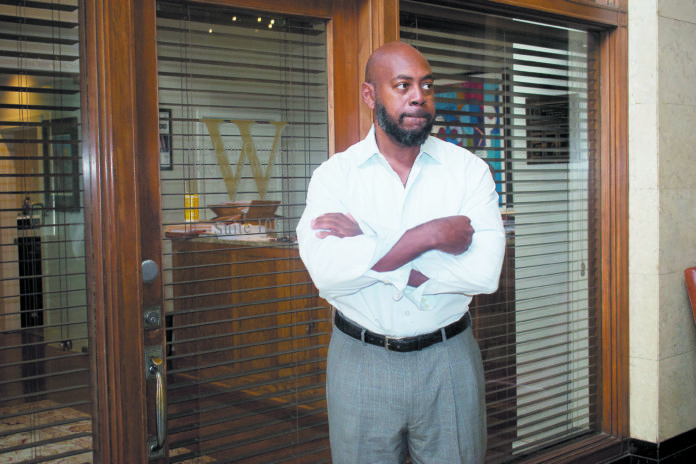With self-evident passion, attorney Ricky E. Wilkins is opening the door to discussion of a Black political action committee – Black Pac – to harness the political power of the African-American community and free candidates from what he calls the grip of white-owned businesses.
He debuted the concept during a presentation on the campus of LeMoyne-Owen College recently. Now he is pitching for civic groups, churches, political organizations and others to view the presentation, weigh it and join what he frames as a divinely inspired path to empowerment.
“I don’t care who you are. I don’t care what part of town you live in. I don’t care how big a person you think you are. Your life in Memphis, Tennessee is fundamentally underneath where (it ought to be) because in Memphis, Tennessee, my hometown, certain people have a grip on us like you won’t imagine,” he said during the presentation.
As envisioned, the Black PAC would be the funding source for African-American candidates. Wilkins said he and others already are raising money and that he has pledged $10,000.
“I’m going to make it hard for any Black politician or community leader to say no. … We’re going to replace 100 percent of any campaign money that people have. I want to take away their excuse for not getting on board,” said Wilkins in an interview with The New Tri-State Defender.
“So if you got $10,000 in your campaign coffer and you got $8,000 of that money from white businessmen, I want you to give it back to them. And then through the Black PAC, we are going to replenish your fund 100 percent.”
A lack of resources is not the issue for African Americans, Wilkins said.
“It’s how we spend it. We can fund this Black PAC… I already got brothers and sisters calling in pledging to the Black PAC. They just needed someone to turn the light bulb on. I’m just mad that it took me this long to flip the damn switch.”
Knowing that such an idea would stir emotions, Wilkins wants to “cause folk to think more deeply and critically than we have. … There are times when things are brought to your attention that become so jarring that it makes you stop and take due notice of what’s going on. And you look at things through a more critical lens.”
Wilkins is not saying that he has all the answers and everything figured out.
“This has to be a community-wide effort. That’s why I’m calling on all churches, fraternities, sororities, civic organizations – all organizations of any kind to host watch parties. Listen to my speech. It has in it the recipe for what we have to do to get our total community healthy.
“Man, we are sick right now. We are sick. And we got to come up with some new ingredients to heal us. And we can do that.”
Going forward necessitates drawing a line in the sand, he said.
“I’m going to ask every politician, every so-called community leader, every whatever: ‘What side of the line are you on?’ I just want to know. The people want to know. The people deserve to know. …If you think you’re going to straddle the fence, that some of our people are so prolific at doing, I interpret that as you are on the wrong side of that line.”
The African-American community needs “to be very clear about who we are and where we are and what we’re going to do to heal this community,” said Wilkins. “And I cannot play with anybody who wants to play games. Make your decision. I don’t care which one you make, but make it. So that the people can either come up and embrace you or step on you.”

Wilkins, who tried – unsuccessfully – to wrest the District 9 Congressional seat from longtime-incumbent Steve Cohen, said the Black PAC is not something he came up with to gain office.
“I’m only doing and communicating what has been placed in my heart,” he said. “I can’t take personal credit for it because it came from a place far beyond me.”
A renowned attorney, Wilkins said, “I didn’t go to law school just to be a lawyer. I went to law school to learn the technical skills that I needed in order to best apply it to a people that have been yearning for leadership; suffering for lack of leadership.”
Asked if the idea of the Black PAC is modeled after a forerunner, Wilkins said. “I don’t have intimate knowledge about everything that may or may not be happening out in the universe. … I will say this. … I’m not aware of a single time in the history of Memphis when someone came forward with an idea that said, ‘We don’t have to take white folks’ money. We don’t want white folks money, in our political environment. … We will be better off without it.’
“And I’m going to show and demonstrate and prove what I’m saying. And I think that is the reason why people are so excited, because people have wanted this sort of self-determination, but it has eluded us.”
Soon, Wilkins, who graduated from Howard and Vanderbilt, will celebrate 30 years as a practicing attorney. He sees himself as coming out of a 10-year period where he went inward, dealing, in part, with the aftermath of some encounters that he chose not to detail for this article.
At root, he wanted to get at why African Americans, he said, are unable to count on the critical seven votes needed on the Memphis City Council and the Shelby County Board of Commissioners to pass legislation that specifically would improve the fortunes of African Americans and – generally – the community as whole.
“All you need is seven votes, seven votes to do anything you want to do. …You need seven votes. … We can’t get to seven. You know why? Because there’s always one or two (African Americans outside of the loop).”
As for the less than a handful of White businessmen who he said have the African-American community on political lockdown, Wilkins would not name names, saying not yet and that he would if the need arises.
And while he knows some will label his move racist, he said that is not so. He expresses gratitude for the mentors and associates in his life who are White, adding that his message to White business people just gets down to this:
“We’re just saying we don’t want it (your money) in our politics. If you want to support, endow a scholarship in perpetuity, which we know you’ve got the money to do, we’ll gladly (support you). We just not going to take your money (for politics).”
Stay tuned, he said.



